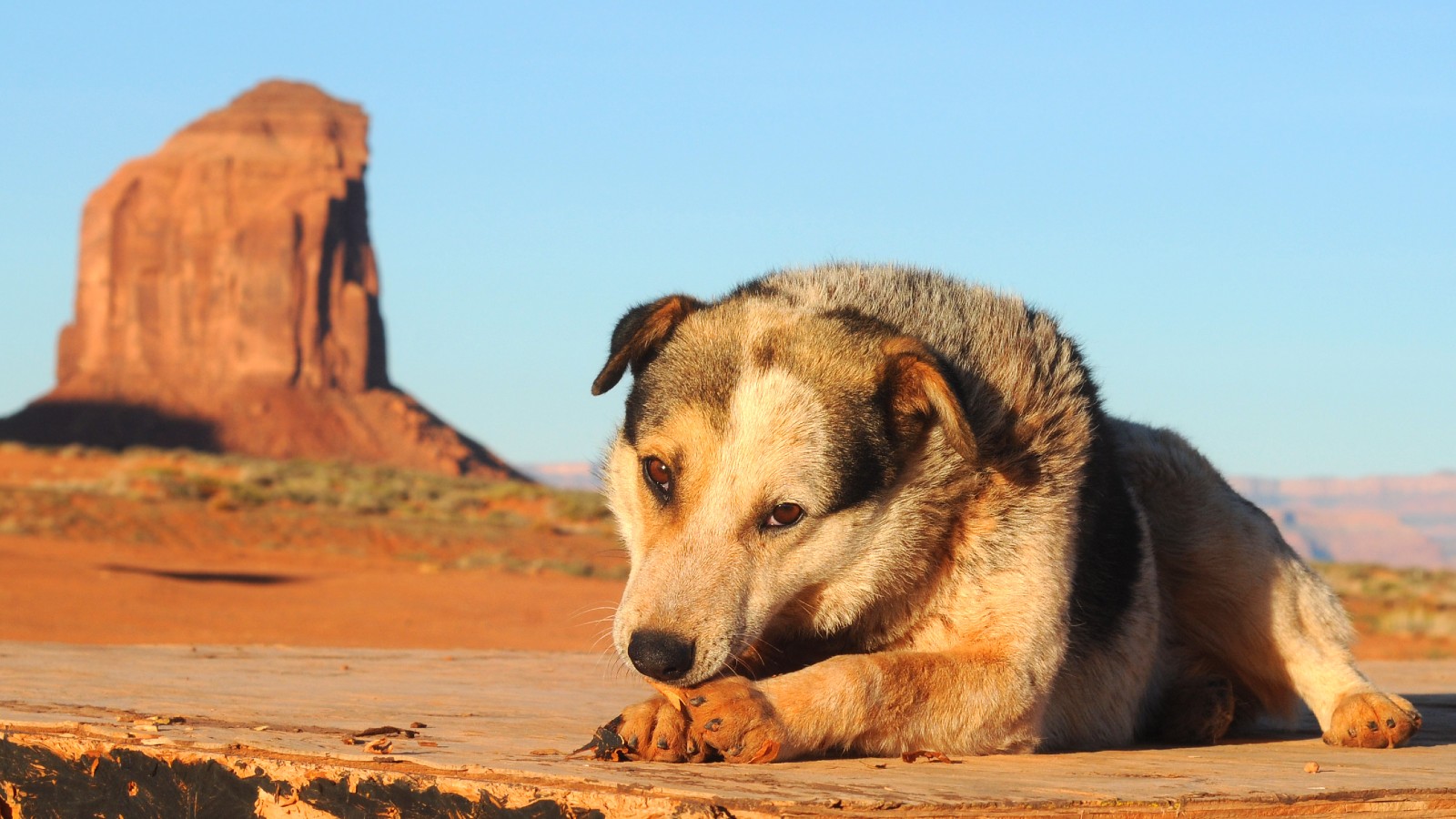I’ve been a vegetarian for over a decade. It’s not because of my health, or because I dislike the taste of chicken or beef: It’s a lifestyle choice I made because I wanted to reduce my impact on the planet. And yet, twice a day, every day, I lovingly scoop a cup of meat-based kibble into a bowl and set it down for my 50-pound rescue dog, a husky mix named Loki.
Until recently, I hadn’t devoted a huge amount of thought to that paradox. Then I read an article in the Associated Press headlined “People often miscalculate climate choices, a study says. One surprise is owning a dog.”
Secure · Tax deductible · Takes 45 Seconds
Secure · Tax deductible · Takes 45 Seconds
The study, led by environmental psychology researcher Danielle Goldwert and published in the journal PNAS Nexus, examined how people perceive the climate impact of various behaviors — options like “adopt a vegan diet for at least one year,” or “shift from fossil fuel car to renewable public transport.” The team found that participants generally overestimated a number of low-impact actions like recycling and using efficient appliances, and they vastly underestimated the impact of other personal decisions, including the decision to “not purchase or adopt a dog.”
The real objective of the study was to see whether certain types of climate information could help people commit to more effective actions. But mere hours after the AP published its article, its aim had been recast as something else entirely: an attack on people’s furry family members. “Climate change is actually your fault because you have a dog,” one Reddit user wrote. Others in the community chimed in with ire, ridiculing the idea that a pet chihuahua could be driving the climate crisis and calling on researchers and the media to stop pointing fingers at everyday individuals.
Goldwert and her fellow researchers watched the reactions unfold with dismay. “If I saw a headline that said, ‘Climate scientists wanna take your dogs away,’ I would also feel upset,” she said. “They definitely don’t,” she added. “You can quote me on that.”
Claire Elise Thompson / Grist
The study set out to understand how to shift behavior by communicating climate truths. Instead, its media coverage revealed a troubling psychological trade-off: When climate-related messaging strikes a nerve, it may actually turn people off from the work of shifting societal norms.
It’s an instinct I understand on some level. I love Loki, and my knee-jerk reaction is to defend the very personal choice of sharing one’s life with a dog. I also sympathize with redirecting the blame toward the biggest polluters: billionaires and fossil fuel companies (not Bon-Bon, the pet chihuahua in question). But is it irresponsible to shrug off any conversation about the environmental impact of our pets — something far more within our control than, say, the overthrow of capitalism?
Is there a way to have a frank discussion about the climate impact of our personal lives without it going to the dogs?

Oftentimes, when I’m questioning how a particular climate behavior might fit into my life, I try to imagine how it looks in my vision of a sustainable future. It’s why, for instance, I don’t own a car and am dedicated to riding public transit, even though it isn’t always super convenient. I’m keen to be an early adopter of systems I believe in. But I struggle to imagine a future without companion animals, even knowing about their environmental impact — which is admittedly substantial.
Dogs and cats eat meat-heavy diets, which is where the bulk of their carbon pawprint comes from. A 2017 study from UCLA found that dogs and cats are responsible for about 25 to 30 percent of the environmental impact of meat consumption in the United States. That’s equivalent to a year’s worth of driving by 13.6 million cars. For pets that eat traditional kibble or wet food, that protein may come from meat byproducts — otherwise-wasted animal parts, such as organs and bones, not approved for human consumption. But an increasing number of pet owners are opting to feed their fur babies “human-grade” meat products, which requires additional resources and generates extra emissions.
After they eat, of course, they poop. A lot. At least for dogs, that poop typically gets bagged in plastic and sent to the landfill. And it turns out all the biodegradable poop bags I’ve diligently bought over the years don’t help matters much; they also release greenhouse gases in landfills, and most composting programs don’t accept pet waste.
With more dogs around than ever before — the U.S. dog population has steadily increased from 52.9 million in 1996 to a new peak of 89.7 million in 2024 — their overall climate toll is more than a chihuahua-sized issue. But pets are also more than just sources of carbon pollution. According to a 2023 Pew Research poll, 97 percent of owners say they consider their pets to be part of their families, with 51 percent of respondents saying they are on the same level as a human family member. So whenever their climate impact crops up in the discourse, as it has periodically, it makes sense that people tend to get defensive.
This don’t-you-dare-take-away-my-dog-you-horrible-environmentalist backlash is certainly not the first time the climate movement has been accused of depriving people of the things they love. Climate policy has long been painted as a force for austerity, coming for your burgers, your gas stoves, your coal-mining jobs. That framing has been politically potent, used by fossil fuel interests and their allies to stoke resentment and delay government action. Big Oil at once wants us to believe that the climate crisis is our fault and that we shouldn’t have to give up anything to fix it.
For some climate advocates, the solution has been to shift messaging away from individual responsibility and focus instead on big, systemic changes like overhauling our electricity and transit systems through governmental investment in clean energy. In her essay “I work in the environmental movement. I don’t care if you recycle,” author and podcaster Mary Annaïse Heglar wrote: “The belief that this enormous, existential problem could have been fixed if all of us had just tweaked our consumptive habits is not only preposterous; it’s dangerous … It’s victim blaming, plain and simple.”
Heglar and others have taken a strong stance against environmental purity — the idea that you can’t care about or advocate for systems-level change if you aren’t first changing your own habits. But not everyone agrees that individual actions should be completely deemphasized in the climate conversation. Kimberly Nicholas, a climate scientist and author of the popular book Under the Sky We Make, has argued that wealthy people living in wealthy countries — and globally, “wealthy” is a lower bar than you might think — do have a responsibility to slash their outsize carbon emissions. And particularly for those of us living in democracies, personal action isn’t just about the choices we make as consumers.
“There’s still an ongoing tension between personal and system change, or individual and collective action,” Nicholas said. “It’s really hard to get that right — to get the right balance there that acknowledges the role and the importance of both, and to talk about and study and describe both in a way that motivates people to take high-impact actions.”
Goldwert saw that tension play out in her maligned climate communications study. In the experiment, participants reviewed 21 individual climate actions (like eating less meat) and five systemic actions (like voting) and rated their commitments to taking each action. Two test groups then received clarifying information about the relative impact of the 21 individual actions — one group was asked to estimate their ranking before learning how they actually ranked, the other group received the information straight-up. But participants didn’t receive any data about the carbon-mitigation potential of the five collective actions, which would be far more difficult to quantify.
What Goldwert’s team found surprised them: The teachings did nudge people toward higher-impact personal actions, but their stated likelihood of engaging in collective ones actually went down — a backfire effect that hints at the perils of focusing too much on personal lifestyle choices.
“It might be kind of like a mental substitution,” Goldwert said. “People feel like, ‘OK, I’ve done my part individually. I kind of checked the box on climate action.’”
Participants were also asked to rate the “plasticity” of each of the actions, or how easy it would be to adopt. And those measurements revealed another nuance in how people view different forms of climate action. For the individual-focused options, participants were more likely to commit to actions they saw as requiring little effort. For the systemic actions, they were more interested in whether it would have an impact — something researchers are still working on quantifying.
“If you think voting or marching is just symbolic or ineffective, you’re not going to engage,” Goldwert said. “We have to show people evidence that their voice or their vote can shift policy, corporate practices, or social norms.”

I, for one, was surprised to see that participants rated the commitment to “not purchase or adopt a dog” as easy. When I asked Goldwert what might be behind that, she noted that dog ownership is a decision people don’t make very often. It also doesn’t require any action at all for people who already don’t own dogs. The results surely would have been different if the listed action was “get rid of your existing dog.” (Which it was not — a point that readers seemed to miss, based on Reddit comments about the study and the “crazy emails” Goldwert said she received.)
Still, for an animal lover like me, the idea of never adopting another dog doesn’t feel easy to commit to at all. It feels like an immense sacrifice. The sadness I feel at the thought of a future without dogs points me to another important factor when it comes to motivation for climate action: joy.

Claire Elise Thompson / Grist
Actions we take to try and mitigate the climate crisis may be partially driven by how easy they are for us or how effective we believe them to be — but any choice we make is also driven by what we find joy in. It’s an essential part of staying committed and resilient in the fight for a better future. In this way, carbon-intensive activities like dog ownership have value beyond their weight in emissions.
“People have an emotional attachment to the people and animals and creatures that we love,” Nicholas said. “And that is actually, I think, very powerful. We’re not only going to solve climate change by lining up all the numbers — we certainly need to do that, but we have to tap into what people really care about and realize all those things are on the line and threatened by the amount of climate change we’re heading for with current policies.”
Would I fight to ensure that dogs, like my beloved Loki, can continue wagging happily on this planet? Heck yes, I would. I’ve always felt that being a pet person goes hand-in-hand with a sense of altruism and responsibility. And if not giving up our pets means fighting climate change, by voting, marching, donating, advocating, and consuming like our pets’ lives depend on it, I think we can all get on board.
That might also mean adjusting our pets’ diets. While making my dog a full vegetarian seems challenging (though technically possible), just cutting out beef has a significant impact — shifting to “lower-carbon meats” was even one of the high-impact actions included in Goldwert’s study. That’s one Loki can easily commit to. And we already buy insect-based treats, which leave a pungent odor in my pockets but seem to please his taste buds.
There are also ways that dog ownership intersects with other climate-related behaviors. Anecdotally, I would say I travel less because I have a dog whose care I need to think about. Walking him every day has also made me vastly more connected to my local environment, the goings-on in my neighborhood, and my neighbors themselves — all of which are important aspects of building climate resilience. Some dogs have even been trained to sniff out invasive species and help identify environmental contaminants. (Not Loki, who has never worked a day in his life.)
Though I’d never thought about it quite this way before I read Goldwert’s study, the climate actions I take have a lot to do with the love I feel for Loki. Not because I want to leave a better world for him — I recognize the reality that I will almost certainly outlive him — but because my feelings for him bring me closer to the love I feel for all living things on this planet. This “ice age predator” who shares my home, as the anthropologist and comedian David Ian Howe puts it, is a living reminder of the relationship humans have with other species, going back many thousands of years.
As the saying goes, “‘Be the person your dog thinks you are.’” And next time you get a little worked up about the realities of the climate crisis and your accountability within it, consider taking yourself on a walk.




